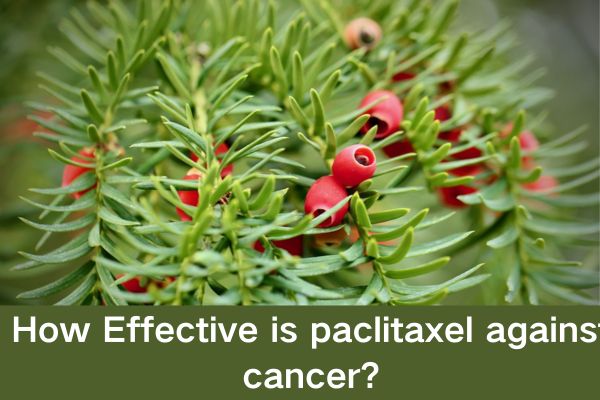How Effective is paclitaxel against cancer? Paclitaxel, a natural compound extracted from the bark of the Pacific yew tree, is one of the most widely used anti-cancer drugs in clinical practice. Let’s take a look at how effective paclitaxel is against cancer.
1. Inhibition of tubulin polymerization and destruction of tumor cytoskeleton
Paclitaxel can bind to tubulin and inhibit its polymerization, thereby destroying the skeleton of tumor cells. This mechanism prevents cell division, leading to cell death. In proliferating tumor cells, tubulin polymerization and skeleton formation are essential for maintaining cell morphology and division, so paclitaxel effectively inhibits tumor cell growth and reproduction by inhibiting this process.
Second, induce cell apoptosis
In addition to inhibiting cell division by disrupting tumor cytoskeleton, paclitaxel can also induce tumor cell apoptosis. Apoptosis is an active cell death process that involves the activation of a series of genes and proteins. Paclitaxel can activate these genes and proteins, triggering apoptosis signaling pathways that lead to active tumor cell death.
3. Anti-angiogenesis effect
Paclitaxel can also inhibit tumor angiogenesis, thereby cutting off the tumor’s nutrient supply and further inhibiting tumor growth and spread. Tumor angiogenesis is an important process of tumor growth and metastasis, which involves the expression and regulation of a series of angiogenic factors. Paclitaxel can inhibit tumor angiogenesis and further inhibit tumor growth and spread by inhibiting the expression and activity of these factors.
4. Immunomodulatory effects
In recent years, studies have found that paclitaxel also has certain immunomodulatory effects. It can enhance the immunogenicity of tumor cells, promote the infiltration and activation of immune cells such as T cells, and thus enhance the anti-tumor immune response of the body. This immunomodulatory effect can be synergistic with the direct anti-tumor effect of paclitaxel to further improve the anti-tumor effect.
In conclusion, the anti-cancer mechanism of paclitaxel is multi-factorial, including inhibition of tubulin polymerization, induction of apoptosis, anti-angiogenesis and immune regulation. These mechanisms cooperate with each other to exert anti-tumor effects. However, the complexity of cancer determines that a single drug is often difficult to completely cure cancer, so the future direction of research will be how to combine paclitaxel with other anti-cancer drugs or treatments to obtain better therapeutic effects. At the same time, with a deeper understanding of the mechanism of action of paclitaxel, we are expected to discover more potential drug targets and provide new ideas for the development of more effective anti-cancer drugs.
Note: The potential benefits and applications presented in this article are derived from the published literature.
Post time: Jan-22-2024
